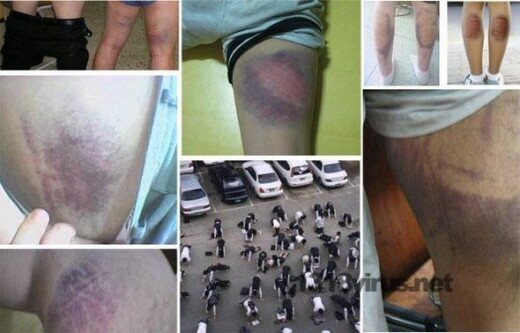hankyoreh
Links to other country sites 다른 나라 사이트 링크
Gyeonggi Province liberalizes student regulations

By Hong Yong-duk, Senior staff writer
A “student human rights ordinance” including a complete ban on corporal punishment for elementary, middle, and high school students and liberalization of student hairstyles has been established for Gyeonggi Province. Revolutionary changes are expected in Korean school culture, as Gyeonggi is first of the nation’s 16 metropolitan and provincial offices of education to establish an ordinance spelling out the ban on student corporal punishment, which has been a customary practice in schools.
At its 253rd regular meeting Friday, the Gyeonggi Provincial Council passed 16 measures that included an ordinance for student rights in the province. This legislation was passed with a vote of 68 voting in favor, three against, and six abstaining among the 77 council members in attendance. Forty-two Grand National Party-affiliated council members were absent. The 2,074 elementary, middle, and high schools in the Gyeonggi region, attended by some 1.82 million students, must change their student behavior regulations within six months of the ordinance’s announcement to implement the changes.
With the enactment of this ordinance, all corporal punishment is prohibited in Gyeonggi-area elementary, middle, and high schools. With this, thorough changes are now inevitable for school behavioral regulations drafted according to the “Student Behavior Regulations Exemplar” sent to schools in 2002 by the Ministry of Education, Science and Technology (MEST) and Human Resources Development.
At the time, the ministry said, “If it is unavoidable for educational purposes, teachers may discipline students with corporal punishment using a linear punishment instrument made of wood measuring 1 to 1.5 cm in diameter and up to 50 to 60cm in length.”
Hairstyles have also been liberalized. However, styles such as permanent waves and dyed hair color have been left to the discretion of individual schools.
In addition, schools are not allowed to compel students to attend nighttime self-study and supplementary classes, and carrying of cell phones at school has been liberalized except during class time.
Discriminatory treatment such as forcing a student to withdraw because of pregnancy or childbirth has been forbidden, as has the practice of forcing students to attend events for particular religions or to attend religious courses without the possibility of substitution.
The Gyeonggi Provincial Office of Education must establish a twenty-member student human rights review committee. Of the twenty members, five are to be chosen as student human rights advocates and given the authority to investigate instances of student human rights violations. The 25 regional offices of education in the Gyeonggi Area are also required to establish student human rights centers.
With opinions divided among teachers and education groups over this ordinance, observers are predicting a heated debate over its passage. In a statement Friday, the Gyeonggi chapter of the Korean Teachers’ and Education Workers’ Union (KTU, Jeon Gyo Jo) stated that it “welcomes the enactment of a human rights ordinance, a long-cherished dream of students and their parents and of education, civic, and social groups” and that “follow-up measures are urgently needed to dispel concerns that teachers’ educational rights and students’ study rights might be violated.”
Meanwhile, the Gyeonggi Federation of Teachers’ Associations said that it was “not too late to enact an ordinance after first establishing a basic framework at the national level through legislation.”
“If the performance of duties that a student must observe becomes lax due to stronger student human rights, this will lead to chaos in our schools,” the group said.
Please direct questions or comments to [englishhani@hani.co.kr]
Editorial・opinion
![[Column] Park Geun-hye déjà vu in Yoon Suk-yeol [Column] Park Geun-hye déjà vu in Yoon Suk-yeol](https://flexible.img.hani.co.kr/flexible/normal/500/300/imgdb/original/2024/0424/651713945113788.jpg) [Column] Park Geun-hye déjà vu in Yoon Suk-yeol
[Column] Park Geun-hye déjà vu in Yoon Suk-yeol![[Editorial] New weight of N. Korea’s nuclear threats makes dialogue all the more urgent [Editorial] New weight of N. Korea’s nuclear threats makes dialogue all the more urgent](https://flexible.img.hani.co.kr/flexible/normal/500/300/imgdb/original/2024/0424/7317139454662664.jpg) [Editorial] New weight of N. Korea’s nuclear threats makes dialogue all the more urgent
[Editorial] New weight of N. Korea’s nuclear threats makes dialogue all the more urgent- [Guest essay] The real reason Korea’s new right wants to dub Rhee a founding father
- [Column] ‘Choson’: Is it time we start referring to N. Korea in its own terms?
- [Editorial] Japan’s rewriting of history with Korea has gone too far
- [Column] The president’s questionable capacity for dialogue
- [Column] Are chaebol firms just pizza pies for families to divvy up as they please?
- [Column] Has Korea, too, crossed the Rubicon on China?
- [Correspondent’s column] In Japan’s alliance with US, echoes of its past alliances with UK
- [Editorial] Does Yoon think the Korean public is wrong?
Most viewed articles
- 1‘We must say no’: Seoul defense chief on Korean, USFK involvement in hypothetical Taiwan crisis
- 2N. Korean delegation’s trip to Iran shows how Pyongyang is leveraging ties with Moscow
- 3[Column] Park Geun-hye déjà vu in Yoon Suk-yeol
- 4Amnesty notes ‘erosion’ of freedom of expression in Korea in annual human rights report
- 5‘Weddingflation’ breaks the bank for Korean couples-to-be
- 646% of cases of violence against women in Korea perpetrated by intimate partner, study finds
- 7[Reportage] On US campuses, student risk arrest as they call for divestment from Israel
- 8“Parental care contracts” increasingly common in South Korea
- 9[Interview] Dear Korean men, It’s OK to admit you’re not always strong
- 10Korean government’s compromise plan for medical reform swiftly rejected by doctors